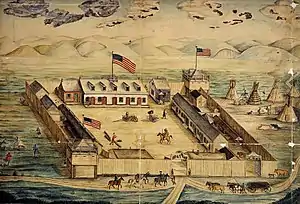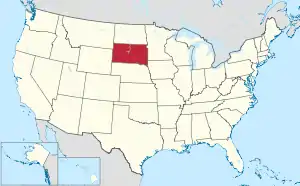Stanley County | |
|---|---|
 Watercolor drawing of Fort Pierre Chouteau. Dated 1854. | |
 Location within the U.S. state of South Dakota | |
 South Dakota's location within the U.S. | |
| Coordinates: 44°24′N 100°45′W / 44.4°N 100.75°W | |
| Country | |
| State | |
| Founded | 1873 (created) 1890 (organized) |
| Named for | David S. Stanley |
| Seat | Fort Pierre |
| Largest city | Fort Pierre |
| Area | |
| • Total | 1,517 sq mi (3,930 km2) |
| • Land | 1,444 sq mi (3,740 km2) |
| • Water | 73 sq mi (190 km2) 4.8% |
| Population (2020) | |
| • Total | 2,980 |
| • Estimate (2022) | 2,999 |
| • Density | 2.0/sq mi (0.76/km2) |
| Time zones | |
| western portion | UTC−7 (Mountain) |
| • Summer (DST) | UTC−6 (MDT) |
| eastern portion | UTC−6 (Central) |
| • Summer (DST) | UTC−5 (CDT) |
| Congressional district | At-large |
| Website | www |
Stanley County is a county in the U.S. state of South Dakota. As of the 2020 census, the population was 2,980.[1] Its county seat is Fort Pierre.[2] The county was created in 1873, and was organized in 1890.[3] It is named for David S. Stanley, a commander at Fort Sully from 1866 to 1874, which was located nearby.[4]
Stanley County is included in the Pierre, SD Micropolitan Statistical Area.
Geography
Stanley County's northwestern boundary is defined by the Cheyenne River which flows eastward, to discharge into the Missouri River at the most northerly point of Stanley County. From there, the county's northeast boundary is defined by the southeastward-flowing Missouri. The county terrain consists of semi-arid rolling hills, carved by drainages. The area is partially devoted to agriculture.[5] The terrain slopes to the east; its highest point is in the SW county corner, at 2,198 ft (670 m) ASL.[6] The county has a total area of 1,517 square miles (3,930 km2), of which 1,444 square miles (3,740 km2) is land and 73 square miles (190 km2) (4.8%) is water.[7]
The eastern portion of South Dakota's counties (48 of 66) observe Central Time; the western counties (18 of 66) observe Mountain Time. Stanley County is on the western end of counties which observe Central Time, and its residents are split east–west in their time observance.[8] Although Fort Pierre, the seat of Stanley County, is located in the Mountain Time Zone, most residents of the city use Central Time because of close social and economic ties with Pierre, which is located in the Central Time Zone.
Major highways
Adjacent counties
- Dewey County - north
- Sully County - northeast
- Hughes County - east
- Lyman County - southeast
- Jones County - south
- Haakon County - west
- Ziebach County - northwest[6]
Protected areas[5]
- Antelope Creek State Game Production Area
- Antelope Creek State Lakeside Use Area
- Brush Creek State Game Production Area
- Chantier Creek State Game Production Area
- Chantier Creek State Lakeside Use Area
- Fort George State Game Production Area
- Fort Pierre National Grassland (part)
- Foster Bay State Lakeside Use Area
- Frozen Man Creek State Game Production Area
- Hayes Lake State Game Production Area
- Minneconjou State Game Production Area
- Minneconjou State Lakeside Use Area
- Oahe Downstream State Recreation Area
- Schomer Draw State Game Production Area
- West Shore State Lakeside Use Area
Lakes
- Lake Oahe (part)
- Lake Sharpe (part)
Demographics
| Census | Pop. | Note | %± |
|---|---|---|---|
| 1880 | 793 | — | |
| 1890 | 1,028 | 29.6% | |
| 1900 | 1,341 | 30.4% | |
| 1910 | 14,975 | 1,016.7% | |
| 1920 | 2,908 | −80.6% | |
| 1930 | 2,381 | −18.1% | |
| 1940 | 1,959 | −17.7% | |
| 1950 | 2,055 | 4.9% | |
| 1960 | 4,085 | 98.8% | |
| 1970 | 2,457 | −39.9% | |
| 1980 | 2,533 | 3.1% | |
| 1990 | 2,453 | −3.2% | |
| 2000 | 2,772 | 13.0% | |
| 2010 | 2,966 | 7.0% | |
| 2020 | 2,980 | 0.5% | |
| 2022 (est.) | 2,999 | [9] | 0.6% |
| U.S. Decennial Census[10] 1790-1960[11] 1900-1990[12] 1990-2000[13] 2010-2020[1] | |||
2020 census
As of the census of 2020, there were 2,980 people.
2010 census
As of the census of 2010, there were 2,966 people, 1,228 households, and 857 families in the county. The population density was 2.1 inhabitants per square mile (0.81/km2). There were 1,387 housing units at an average density of 1.0 per square mile (0.39/km2). The racial makeup of the county was 90.0% white, 6.6% American Indian, 0.3% black or African American, 0.1% Asian, 0.2% from other races, and 2.8% from two or more races. Those of Hispanic or Latino origin made up 0.7% of the population. In terms of ancestry, 46.4% were German, 12.5% were Irish, 10.8% were English, 10.7% were Norwegian, 8.4% were Czech, 5.0% were Swedish, and 2.5% were American.
Of the 1,228 households, 30.8% had children under the age of 18 living with them, 56.7% were married couples living together, 8.5% had a female householder with no husband present, 30.2% were non-families, and 26.2% of all households were made up of individuals. The average household size was 2.42 and the average family size was 2.87. The median age was 41.9 years.
The median income for a household in the county was $51,875 and the median income for a family was $54,722. Males had a median income of $33,929 versus $25,574 for females. The per capita income for the county was $27,435. About 8.8% of families and 11.9% of the population were below the poverty line, including 18.1% of those under age 18 and 17.3% of those age 65 or over.
Communities
City
- Fort Pierre (county seat)
Unincorporated communities[5]
- Hayes
- Mission Ridge
- Sansarc
- Wendte
Townships
Stanley County has no townships. It is divided into three areas of unorganized territory: Lower Brule, North Stanley, and South Stanley.
In popular culture
The Triple U Buffalo Ranch in northern Stanley County was used in filming the 1990 movie Dances with Wolves.
Notable person
- Casey Tibbs[14] (1929–1990): cowboy, rodeo performer, and actor
Politics
Stanley County have traditionally voted Republican. No Democratic presidential candidate has won Stanley County since Lyndon Johnson in 1964, whilst Michael Dukakis during the drought-affected 1988 election is the last Democrat to top forty percent.
| Year | Republican | Democratic | Third party | |||
|---|---|---|---|---|---|---|
| No. | % | No. | % | No. | % | |
| 2020 | 1,203 | 72.82% | 421 | 25.48% | 28 | 1.69% |
| 2016 | 1,148 | 73.26% | 329 | 21.00% | 90 | 5.74% |
| 2012 | 1,063 | 69.03% | 435 | 28.25% | 42 | 2.73% |
| 2008 | 1,017 | 65.49% | 510 | 32.84% | 26 | 1.67% |
| 2004 | 1,129 | 69.56% | 464 | 28.59% | 30 | 1.85% |
| 2000 | 955 | 69.15% | 402 | 29.11% | 24 | 1.74% |
| 1996 | 795 | 57.53% | 454 | 32.85% | 133 | 9.62% |
| 1992 | 719 | 51.39% | 427 | 30.52% | 253 | 18.08% |
| 1988 | 698 | 57.26% | 511 | 41.92% | 10 | 0.82% |
| 1984 | 942 | 72.52% | 351 | 27.02% | 6 | 0.46% |
| 1980 | 892 | 68.67% | 339 | 26.10% | 68 | 5.23% |
| 1976 | 637 | 53.57% | 548 | 46.09% | 4 | 0.34% |
| 1972 | 779 | 60.95% | 492 | 38.50% | 7 | 0.55% |
| 1968 | 572 | 51.58% | 439 | 39.59% | 98 | 8.84% |
| 1964 | 549 | 42.26% | 750 | 57.74% | 0 | 0.00% |
| 1960 | 678 | 48.15% | 730 | 51.85% | 0 | 0.00% |
| 1956 | 587 | 50.87% | 567 | 49.13% | 0 | 0.00% |
| 1952 | 695 | 70.63% | 289 | 29.37% | 0 | 0.00% |
| 1948 | 522 | 58.85% | 359 | 40.47% | 6 | 0.68% |
| 1944 | 384 | 62.14% | 234 | 37.86% | 0 | 0.00% |
| 1940 | 679 | 55.66% | 541 | 44.34% | 0 | 0.00% |
| 1936 | 495 | 42.09% | 629 | 53.49% | 52 | 4.42% |
| 1932 | 553 | 41.39% | 757 | 56.66% | 26 | 1.95% |
| 1928 | 739 | 62.42% | 437 | 36.91% | 8 | 0.68% |
| 1924 | 531 | 43.81% | 249 | 20.54% | 432 | 35.64% |
| 1920 | 598 | 56.79% | 394 | 37.42% | 61 | 5.79% |
| 1916 | 254 | 38.25% | 381 | 57.38% | 29 | 4.37% |
| 1912 | 0 | 0.00% | 1,051 | 47.45% | 1,164 | 52.55% |
| 1908 | 2,313 | 56.52% | 1,598 | 39.05% | 181 | 4.42% |
| 1904 | 547 | 56.74% | 396 | 41.08% | 21 | 2.18% |
| 1900 | 254 | 49.51% | 252 | 49.12% | 7 | 1.36% |
| 1896 | 89 | 38.53% | 140 | 60.61% | 2 | 0.87% |
| 1892 | 76 | 49.03% | 29 | 18.71% | 50 | 32.26% |
See also
References
- 1 2 "State & County QuickFacts". United States Census Bureau. Retrieved August 19, 2023.
- ↑ "Find a County". National Association of Counties. Retrieved June 7, 2011.
- ↑ "Dakota Territory, South Dakota, and North Dakota: Individual County Chronologies". Dakota Territory Atlas of Historical County Boundaries. The Newberry Library. 2006. Archived from the original on April 2, 2018. Retrieved March 31, 2015.
- ↑ John Andrews. "Explorers, Cowboys and Indians". www.southdakotamagazine.com. Retrieved March 18, 2020.
- 1 2 3 Stanley County SD Google Maps (accessed February 8, 2019)
- 1 2 ""Find an Altitude" Google Maps (accessed February 8, 2019)". Archived from the original on May 21, 2019. Retrieved February 9, 2019.
- ↑ "2010 Census Gazetteer Files". United States Census Bureau. August 22, 2012. Retrieved March 28, 2015.
- ↑ Map of Time Zone Line through South Dakota (accessed January 30, 2019)
- ↑ "Annual Estimates of the Resident Population for Counties: April 1, 2020 to July 1, 2022". Retrieved April 2, 2023.
- ↑ "U.S. Decennial Census". United States Census Bureau. Retrieved March 28, 2015.
- ↑ "Historical Census Browser". University of Virginia Library. Retrieved March 28, 2015.
- ↑ Forstall, Richard L., ed. (March 27, 1995). "Population of Counties by Decennial Census: 1900 to 1990". United States Census Bureau. Retrieved March 28, 2015.
- ↑ "Census 2000 PHC-T-4. Ranking Tables for Counties: 1990 and 2000" (PDF). United States Census Bureau. April 2, 2001. Archived (PDF) from the original on October 9, 2022. Retrieved March 28, 2015.
- ↑ Andrews, John (May 17, 2016). "Stanley County". South Dakota Magazine.
- ↑ Leip, David. "Atlas of US Presidential Elections". uselectionatlas.org. Retrieved April 15, 2018.